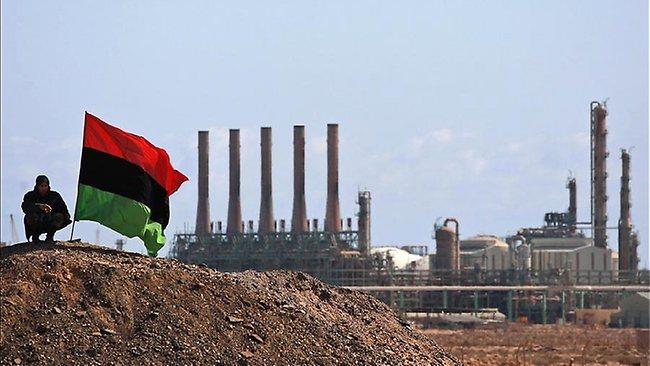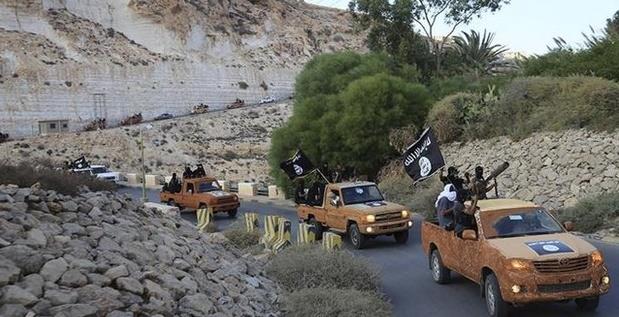Libya's state-run oil corporation has declared 11 oil fields in the country non-operational after attacks by suspected Islamic State militants, opting for a force majeure clause that exempts the state from contractual obligations.
The National Oil Corporation blamed authorities in the Libyan-capital of Tripoli, set up by Islamist-backed militias, for failing to protect the oil fields. The statement, issued Wednesday night, says that "theft, looting, sabotage and destruction" of the oil fields have been on the rise despite pleas for the authorities to ensure safety of Libya's oil installations.
The corporation warned it could take similar action on other Libyan oil terminals and facilities, something it said would directly impact the lives of Libya's people.
"If security deteriorates, the corporation will be forced to close all fields and ports, which will result in a total deficit in state revenues and directly impact people's live, including with power outage," the statement said.
Engulfed in total chaos more than three years since the ouster and killing of dictator Moammar Gadhafi, Libya is bitterly divided between two rival parliaments and governments and a wide array of militias.

The elected government and parliament have been forced to relocate outside of Tripoli after it fell to militias backed by Islamist factions last summer, and set up a base in the country's far east.
The state-run oil corporation also urged the country's rival governments to "put state interest above all and stand together against destruction."
A force majeure, meaning superior force, is a contract clause that frees a party from liability whenever an extraordinary event or circumstance beyond the party's control takes place.
The development came hours after militants from the central coastal city of Sirte — under control of Libya's Islamic State affiliate — stormed the al-Dhahra oil field, about 170 kilometers (100 miles) to the south.
The militants surrounded the oil field from three sides, exchanged gunfire with the guards and prompted the Tripoli-based government to launch airstrikes, which ultimately failed to stop the assault. When the guards ran out of ammunition, the militants stormed the field, looted it and blew up buildings on the facility.

Before al-Dhahra, three other oil fields came under similar assaults, including al-Mabrouk where 10 guards were killed and seven foreigners abducted on Feb. 4. A week later, on Feb. 13, the al-Bahi field, about 250 kilometers (156 miles) from Sirte, was also attacked.
Libya's turmoil has provided fertile ground for Islamic State-linked militants to set up a foothold in the North African country. The militants took control of cities such as Darna in eastern Libya and also Sirte, and have carried out several deadly suicide bombings across the country. In January, they stormed a luxury hotel in Tripoli, and in February released a video showing them beheading 21 Egyptian Christians. The Egyptian military launched airstrikes on Darna in retaliation.
On Feb. 21, two Islamic State suicide bombers killed at least 40 people in the eastern town of Qubba in one of the deadliest days of violence in Libya since downfall of Gadhafi.
The oil corporation earlier said that Libya's oil production has dropped dramatically, to about 25 percent of normal levels. It recently reached 500,000 barrels per day, according to Oil Minister Mashallah al-Zewi.
Khaled Ben Osman, head of the National Council for Oil and Gas in Tripoli, the 11 non-operational oil fields make up 30 percent of the overall number of fields in Libya. The remaining ones are not all operational and a number of them have either closed for maintenance or have remained closed since the anti-Gadhafi uprising.

The looming oil crisis in Libya came a day after the country's elected government made an urgent appeal to the U.N. Security Council to either lift an arms embargo completely or allow exemptions so that its army can fight Islamic State and other groups.
Libya's U.N. Ambassador Ibrahim Dabbashi told the council that his people feel the international community's silence has allowed the threat of "terrorist" groups to spread.
His speech came as U.N. envoy Bernardino Leon is preparing for a new round of peace talks among rival groups in Morocco on Thursday.
The talks are meant find a way out of the crisis, which has left nearly half a million Libyans displaced, whole cities and towns in ruins, and the country internationally isolated with many countries having shut their embassies in Tripoli.
In a good will gesture, Libyan air force commander Saqr al-Jourshi told Dubai-based Al-Arabiya network that he is halting airstrikes — which have targeted both Tripoli and Islamic State's strongholds — for three days to give the talks a chance.
Leon warned on Wednesday that "terrorist groups such as Islamic State will stop at nothing in their bid to play on existing political divisions."